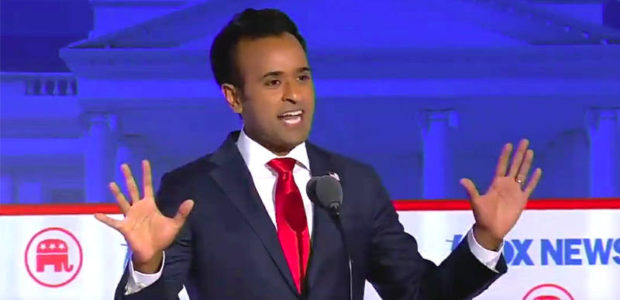


Vivek Ramaswamy has smelled like a conman for a while now with his admission to his colleagues that he is running for president just to sabotage Governor DeSantis, and with his flip flops on certain issues.
But an article in Newsweek might just put a final nail in the Ramaswamy Republican Presidential candidate coffin – at least I hope it does.
Here’s what a former advisor to President Trump has to say and notice the part about the DEI policies he implemented at his company:
Vivek Ramaswamy’s artful narrative, meticulously tailored for the GOP primary voter, weaves a tale of principled sacrifice and success. According to his version, he helmed the leadership of Roivant, a multi-billion-dollar American pharmaceutical company he founded, and gallantly relinquished his CEO role in 2021 due to his unwavering stance against ESG principles, despite facing opposition from his liberal workforce. While this narrative might seem appealing, it is akin to the endless “flip-flops” that have plagued his campaign—an elaborate work of fiction that unravels upon a modicum of scrutiny.
Let’s start with the basics. Ramaswamy has funded his campaign through the sale of over $32 million in Roivant stock options in February of this year. This could lead one to believe that Roivant, based in Bermuda, is thriving and that Ramaswamy is a great entrepreneur. Except the company reported staggering losses of $1.2 billion in its financial report of March 2023. This isn’t a one-time slump: In March 2022, when Ramaswamy was still Roivant’s chairman and a major shareholder, the company reported an annual loss of $924.1 million.
Ramaswamy’s defenders may argue that Roivant performed better during his tenure as CEO in 2021, but alas, the numbers tell a different story. The reality is that Roivant’s finances were abysmal under Ramaswamy’s watch. During his tenure in 2019, the company’s net operating loss exceeded $530 million. By 2020, the losses had doubled to over $1 billion, accompanied by a 65 percent decline in revenue.
These numbers raise a puzzling question: How can a company consistently bleeding billions trade at over $10 a share?
The answer might lie in Ramaswamy’s implementation of Roivant’s diversity, equity, and inclusion (DEI) initiative, called Roivant Social Ventures, during his CEO tenure. Launched in 2020 while Ramaswamy was still CEO, this initiative aimed to foster “DEI opportunities for future leaders in biopharma and biotech.”
While Ramaswamy vocally opposes ESG principles, Roivant’s major institutional investors—including Morgan Stanley, Viking Global, and BlackRock, the very firms he criticizes by name—are among its largest stakeholders, owning over 500 million shares. Ramaswamy himself holds more than 80 million shares, making him an essential partner of these major ESG funds.
In a deeply ironic twist, Ramaswamy’s anti-“woke” campaign is being bankrolled by the profits reaped from the very policies he denounces.
That was just three years ago but it gets worse. At least the way it reads here, it looks like Ramaswamy pulled a big con on pharmaceutical investors:
Yet this irony is not the worst of it. In 2015, there was another sordid affair involving Ramaswamy, over Axovant Sciences Alzheimer’s drug. In June 2015, Ramaswamy appeared on CNBC to praise the Axovant IPO, which soared to over $30 a share based on expectations surrounding its Alzheimer’s drug, Intepirdine. The drug was touted as a “breakthrough,” yet upon closer examination, this development fell apart.
Axovant had acquired the drug for $5 million in December 2014, six months before the IPO, after the majority of Phase 2 trials had “failed to meet their primary endpoints” in 2010. Ramaswamy devised a solution: His mother, Dr. Geetha Ramaswamy, conducted a new Phase 2 trial in 2015 involving “684 subjects.” This trial conveniently claimed to demonstrate sufficient improvement to “support Phase 3” trials.
The aftermath was a triumphant $350 million IPO in 2015, followed by a drastic fall. By September 2017, the stock had plummeted 75 percent after Ramaswamy and his mother announced the Phase 3 trial’s failure. Subsequent trials continued to disappoint, culminating in a 99 percent loss in value and a name change for the company.
While investors suffered significant losses, Ramaswamy profited from a higher media profile, IPO payouts, and the sale of remaining Axovant assets in 2020.
Yeah I think any supporter of his who has an open mind would be very concerned about his candidacy after reading this. As the author, Sam Nunberg, notes, Ramaswamy has already fallen in the polls after the Iowa debate. Hopefully he’ll keep falling right out of the presidential race.
But hey, maybe he could still be Trump’s VP. Trump, being such a good judge of character, recently said that Ramaswamy would be a good choice for VP. Yeah, I know he was trolling right? Well was trolling about locking Hillary Clinton up too back in 2016. Just sayin…
